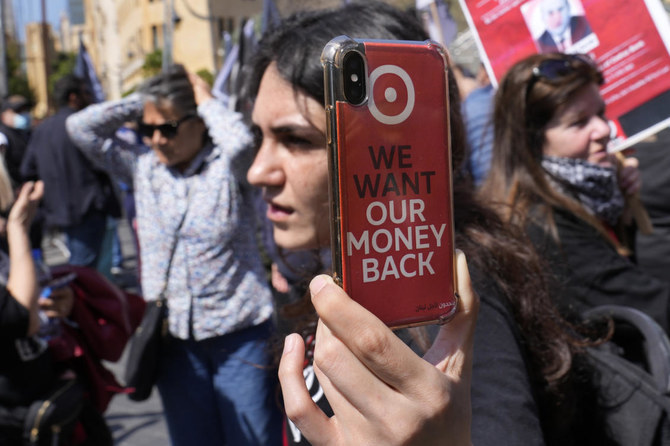BEIRUT: Poverty in Lebanon tripled over the course of a decade during which the small Mediterranean country slid into a protracted financial crisis, the World Bank said Thursday.
The percentage of people in Lebanon living below the poverty line rose from 12 percent in 2012 to 44 percent in 2022, the bank said in a report based on surveys conducted in five of the country’s eight governorates.
The data provided the most detailed snapshot to date on the economic circumstances of the country’s population since the crisis that began in late 2019, although World Bank officials acknowledged it was incomplete as surveyors were not given access to three governates in the south and east of the country.
The findings showed stark differences in poverty levels between different areas of the country and between Lebanese citizens and the country’s large population of Syrian refugees.
In the Beirut governate, in contrast to the rest of the country, poverty actually declined from 4 percent to 2 percent of the population during the decade surveyed, while in the largely neglected Akkar region in the north, the rate increased from 22 percent to 62 percent.
Among Lebanese surveyed, the poverty rate in 2022 was 33 percent, while among Syrians it reached 87 percent. While the survey found an increase in the percentage of Lebanese citizens working in unskilled jobs like agriculture and construction, it found that most Lebanese still work in skilled jobs while the majority of Syrians do unskilled labor.
The report also measured “multidimensional poverty,” which takes into account access to services like electricity and education as well as income, finding that some 73 percent of Lebanese and 100 percent of non-Lebanese residents of the country qualify as poor under this metric.
Beginning in late 2019, Lebanon’s currency collapsed, while inflation skyrocketed and the country’s GDP plummeted. Many Lebanese found that the value of their life savings had evaporated.
Initially, many saw an International Monetary Fund bailout as the only path out of the crisis, but since reaching a preliminary agreement with the IMF in 2022, Lebanese officials have made limited progress on reforms required to clinch the deal, including restructuring the ailing banking sector.
An IMF delegation visiting Beirut this week found that “some progress has been made on monetary and fiscal reforms,” the international financial institution said in a statement, including on “lowering inflation and stabilizing the exchange rate,” but it added that the measures “fall short of what is needed to enable a recovery from the crisis.”
It noted that reforms to “governance, transparency and accountability” remain “limited” and that without an overhaul of the banking sector, the “cash and informal economy will continue to grow, raising significant regulatory and supervisory concerns.”
The World Bank has estimated that the cash economy makes up 46 percent of the country’s GDP, as Lebanese distrustful of banks in the wake of the crisis have sought to deal in hard currency.
The flourishing cash economy has created fertile ground for money laundering and led to concerns that Lebanon could be placed on the Paris-based watchdog Financial Action Task Force’s “grey list” of countries with a high risk of money laundering and terrorism financing.
Poverty in Lebanon tripled over a decade, World Bank says
https://arab.news/wvx7j
Poverty in Lebanon tripled over a decade, World Bank says

- The findings showed stark differences in poverty levels between different areas of the country
- Among Lebanese surveyed, the poverty rate in 2022 was 33 percent, while among Syrians it reached 87 percent
US lawmakers press Israel to probe strike on reporters in Lebanon

- “The IDF has made no effort, none, to seriously investigate this incident,” Welch said
- Collins called for Washington to publicly acknowledge the attack in which an American citizen was injured
WASHINGTON: Several Democratic lawmakers called Thursday for the Israeli and US governments to fully investigate a deadly 2023 attack by the Israeli military on journalists in southern Lebanon.
The October 13, 2023 airstrike killed Reuters videographer Issam Abdallah and wounded six other reporters, including two from AFP — video journalist Dylan Collins and photographer Christina Assi, who lost her leg.
“We expect the Israeli government to conduct an investigation that meets the international standards and to hold accountable those people who did this,” Senator Peter Welch told a news conference, with Collins by his side.
The lawmaker from Collins’s home state of Vermont said he had been pushing for answers for two years, first from the administration of Democratic president Joe Biden and now from the Republican White House of Donald Trump.
The Israeli government has “stonewalled at every single turn,” Welch added.
“With the Israeli government, we have been extremely patient, and we have done everything we reasonably can to obtain answers and accountability,” he said.
“The IDF has made no effort, none, to seriously investigate this incident,” Welch said, referring to the Israeli military, adding that it has told his office its investigation into the incident is closed.
Collins called for Washington to publicly acknowledge the attack in which an American citizen was injured.
“But I’d also like them to put pressure on their greatest ally in the Middle East, the Israeli government, to bring the perpetrators to account,” he said, echoing the lawmakers who called the attack a “war crime.”
“We’re not letting it go,” Vermont congresswoman Becca Balint said. “It doesn’t matter how long they stonewall us.”
AFP conducted an independent investigation which concluded that two Israeli 120mm tank shells were fired from the Jordeikh area in Israel.
The findings were corroborated by other international probes, including investigations conducted by Reuters, the Committee to Protect Journalists, Human Rights Watch, Amnesty International and Reporters Without Borders.
Unlike Welch’s assertion Thursday that the Israeli probe was over, the IDF told AFP in October that “findings regarding the event have not yet been concluded.”















